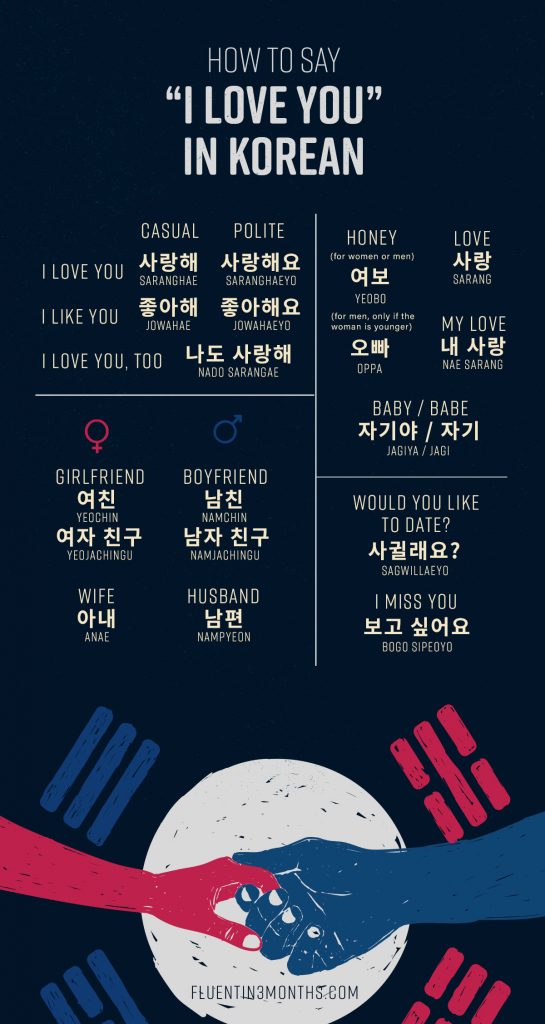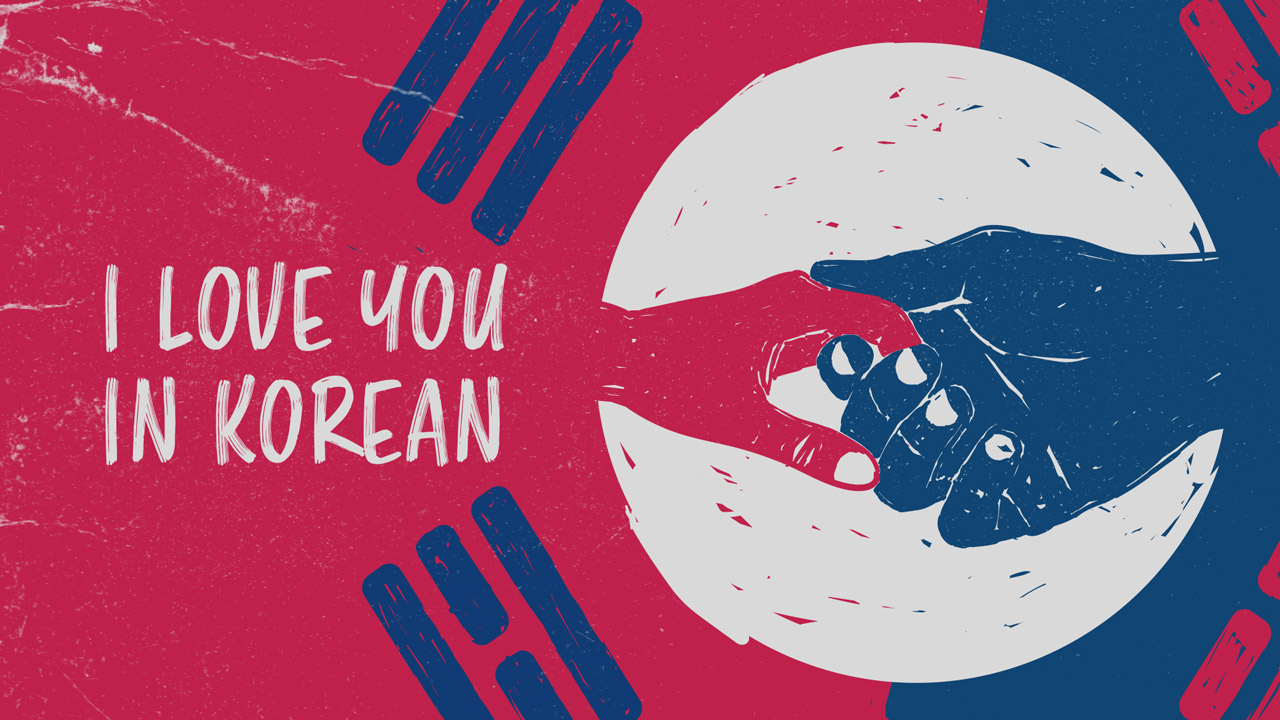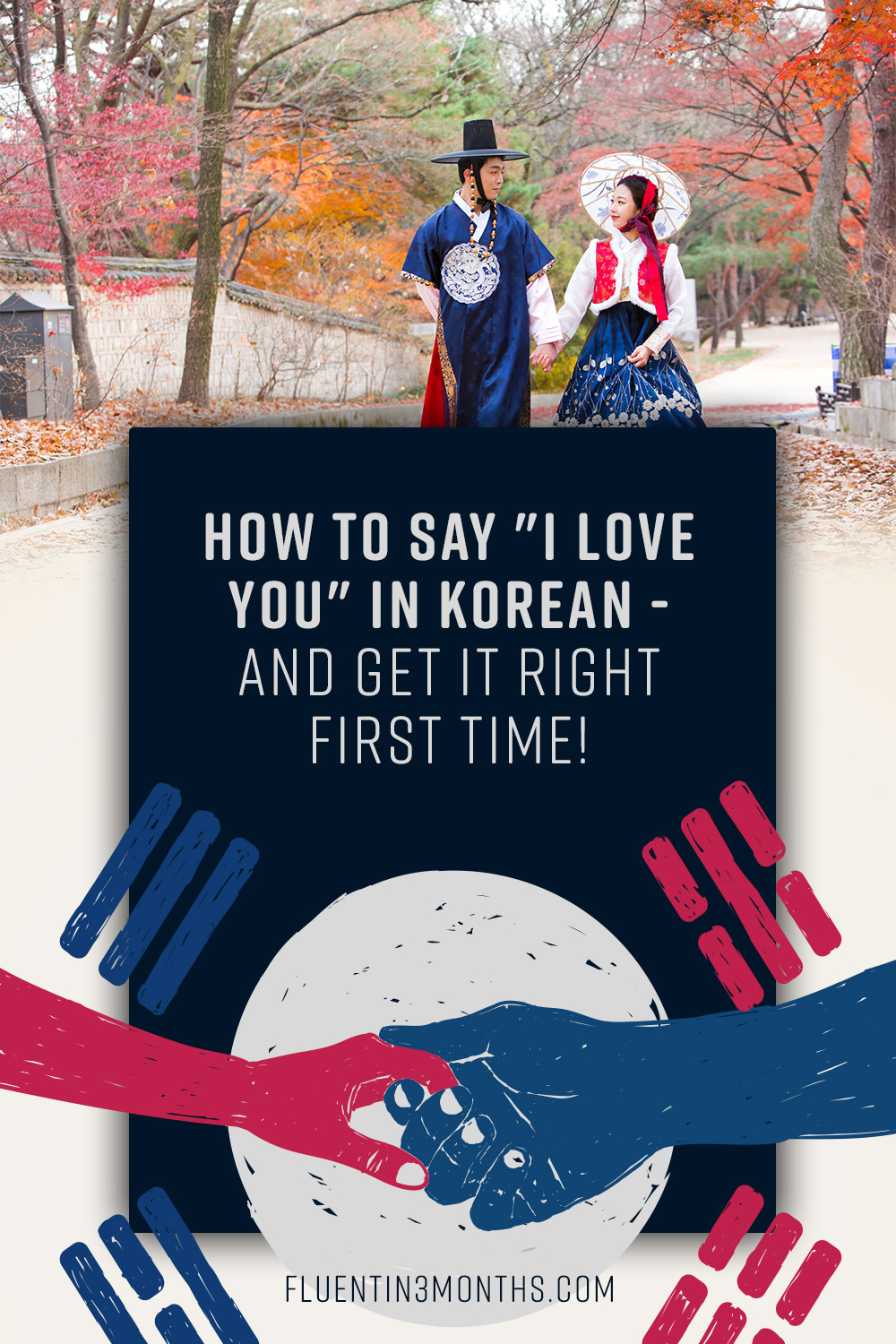How to Say “I Love You” in Korean – Get it Right First Time!
How do you say “I love you” in Korean? And what does “saranghae” mean?
Translate “I love you” in Korean through an app, and it’ll tell you the answer is 사랑해 (saranghae). And 사랑해 (saranghae) does mean “I love you” — but it might not be the right phrase to use!
Why? Because Korean has a hierarchical way of speaking. That means you change how formally you speak depending on who you’re talking to and the situation.
Besides that, Koreans only recently started to be more open with saying “I love you.”
The younger generations will say it more often now, but still not as often as Western cultures might. And older generations, or even parents to kids, may never say it at all.
So before you decide to throw around such an important sentiment in Korean, learn the appropriate way to say it!
How to Say “I Love You” in Korean
If you’re already somewhat familiar with how Korean works, here’s a quick list of ways to say “I love you” in Korean as well as romantic Korean phrases. Then we’ll get into the nitty-gritty (and even more phrases) below.
- “I love you” (casual) – 사랑해 (saranghae)
- “I love you” (polite) – 사랑해요 (saranghaeyo)
- “I like you” (casual) – 좋아해 (jowahae)
- “I like you” (polite) – 좋아해요 (jowahaeyo)
- “I love you, too” (casual) – 나도 사랑해 (nado sarangae)
- “Love” – 사랑 (sarang)
- “My love” – 내 사랑 (nae sarang)
- “Honey” (for women or men) – 여보 (yeobo)
- “Honey” (for men, only if the woman is younger) – 오빠 (oppa)
- “Baby” / “Babe” – 자기야 (jagiya) / 자기 (jagi)
- “Boyfriend” – 남친 (namchin) or 남자 친구 (namjachingu)
- “Girlfriend” – 여친 (yeochin) or 여자 친구 (yeojachingu)
- “Husband” – 남편 (nampyeon)
- “Wife” – 아내 (anae)
- “Special someone” or “Someone precious” – 아끼는 사람 (akkineun saram)
- “In love” – 사랑에 빠진 (sarang-e ppajin)
- “Would you like to date?” – 사귈래요? (sagwillaeyo)
- “I want to be with you” – 같이 있고 싶어요 (gat-i itgo sipeoyo)
- “I miss you” – 보고 싶어요 (bogo sipeoyo)

“I Love You” in Korean – Saranghaeyo
Let’s start with the standard, polite form of “I love you” in Korean – 사랑해요 (saranghaeyo).
사랑해요 (saranghaeyo) is a respectful way to say “I love you”. Because it’s respectful, this phrase often said to parents. In this type of situation, you’re not only saying “I love you”, but you’re also expressing gratitude for all they do.
You could also say 사랑해요 (saranghaeyo) to confess your feelings to someone.
By the way, if you’re wondering how to write “I love you” in Korean because you see it romanized two different ways, don’t worry.
In Korean, the ㄹ character is in between an “l” and an “r” sound in English. So sometimes it’s romanized as salanghaeyo and other times saranghaeyo. But they’re both written the same way in Korean Hangul: 사랑해요.
Now, the informal (and most common) way to say “I love you” in the Korean language is 사랑해 (saranghae).
사랑해 (saranghae) is used between couples, and sometimes even close friends. So if you’re already in a relationship, this is the phrase you’d use.
And to say “I love you, too” in Korean, you’d say 나도 사랑해 (nado sarangae).
There is a formal way to say I love you, which is 사랑합니다 (saranghamnida). But… It’s really too formal for most situations, so it’s not used often.
The most common place you’ll hear this particular phrase is at K-Pop concerts when the bands will say “사랑합니다!” to the audience.
Anytime you address many people at once, like in front of an audience, you’d use the -imnida (formal) endings to show respect.
“Love” in Korean – Sarang
“Love” in the Korean language is 사랑 (sarang).
When you combine it with the verb 하다 (hada, “to do”), it becomes a verb “to love” – 사랑하다 (saranghada).
You’ll notice from the last section then, that all we did was conjugate the verb, 하다 (hada), to different politeness levels. There’s no “I” or “you” in the phrase at all — you’re really only telling someone “Love!”
Korean is a contextual language. When you’re telling someone you love them, it’s usually understood from the context that you mean that person.
But if it’s not clear, or you want to tell someone else who it is you love, then you’d say:
- “_ is the one I love.” – 는/은 내가 사랑하는 사람이야. (neun/eun naega sarangha neun saramiya.)
- “I love that person.” – 나는 그 사람을 사랑해요. (na-neun geu saram-eul saranghaeyo.)
- “I love you” (with “I” and “you”) – 나는 너를 사랑해 (na-neun neo-leul saranghae)
“I Like You” in Korean – Jowahae
좋아해 (jowahae) comes from the verb 좋아하다 (jowahada), meaning “to like.” In its casual form here, you can confess your feelings to a friend, classmate, or love interest.
But like “I love you”, there’s also a polite and a formal form:
- 좋아해요 (jowahaeyo) – “I like you” (polite)
- 좋아합니다 (jowahamnida) – “I like you” (formal)
Again, you won’t hear the formal version often. But you may hear the polite form, especially to show respect during a confession of love.
If you want to use either of these phrases as shorthand, like “I like u” or “I love u” in Korean, then you would just use the short, casual forms: 좋아해! (joahae) or 사랑해 (saranghae).
You can also add emphasis with 정말 (jeongmal) which means “really.”
정말좋아해요. Jeongmal jowahaeyo. “I really like you.”
“My Love” in Korean – Nae Sarang
For “my love” in Korean, you just add “my” to sarang (“love”, remember?) — 내 사랑 (nae sarang).
There are other romantic nicknames you can call your love though, too. Some examples:
- “Honey” (for women or men) – 여보 (yeobo)
- “Honey” (for men, only if the woman is younger) – 오빠 (oppa)
- “Cutie” – 귀요미 (gwiyomi)
- “Baby” / “Babe” – 자기야 (jagiya) / 자기 (jagi)
- “Princess” – 공주님 (gongjunim)
- “Prince” – 왕자님 (wangjanim)
“Boyfriend” and “Girlfriend” in Korean
You’ve probably heard 오빠 (oppa) many times in Korean TV shows. That’s because it’s often what women call their boyfriend who is older than them.
Even though 오빠 (oppa) actually is the respectful term for an older brother, it’s become one of the most common and cute ways to refer to your boyfriend in Korean.
But when talking about your significant other to other people, you need to use the correct, polite terms. They are:
- “Boyfriend” – 남친 (namchin) or 남자 친구 (namjachingu)
- “Girlfriend” – 여친 (yeochin) or 여자 친구 (yeojachingu)
The first one is the shortened form, so it’s a bit more casual. The longer form is more polite. But you can use either when talking about your relationship with others.
“Husband” and “Wife” in Korean
You can also call your husband 오빠 (oppa), and many women do. Men sometimes use the English term 와이프 (waipeu) for “wife.”
But again, when talking to others, it’s best to use the polite terms.
For married couples, they are:
- “Husband” – 남편 (nampyeon)
- “Wife” – 아내 (anae)
Must-Know Gesture to Say “I Love You” in Korean
There is a must-know Korean gesture for “I love you”. If you’re a total newbie to Korean pop culture, you’ll soon see it everywhere.
And if you’re a seasoned K-Pop and K-Drama vet, then you know what I’m about to introduce…

By crossing your thumb and index finger to make a heart, it symbolizes 사랑해 (saranghae), or “I love you” in Korean.
For instance, in the popular K-Drama Crash Landing on You, Se-ri pretends to pull a “gift” out of her sweater pocket for the guys and then flashes them this hand gesture.
In this instance, rather than meaning “I love you”, it’s more like “thank you” or when you use emoji hearts to show care in a social media comment.
Other Romantic Korean Phrases
Okay, we’ve got the basics covered. But what about some other romantic phrases in Korean?
I’ve got you. Here are some loving phrases you can use with your special someone… And some bonus slang phrases about dating:
- “I love you very much* – 너무 사랑해요 (neomu saranghaeyo)
- “I love you a lot” – 많이 사랑해요 (mani saranghaeyo)
- “Special someone” or “someone precious” – 아끼는 사람 (akkineun saram)
- Someone who’s full of love, or has many scandalous dating rumors – 사랑꾼 (sarangkkun)
- Someone who falls in love too easy – 금사빠 (geumsappa)
- “In love” – 사랑에 빠진 (sarang-e ppajin)
- “Would you like to date?” – 사귈래요? (sagwillaeyo)
- “I want to be with you” – 같이 있고 싶어요 (gat-i itgo sipeoyo)
- That in-between stage where you’re not a couple but there’s “something” there – 썸 (sseom)
- “I miss you” – 보고 싶어요 (bogo sipeoyo)
Share the Sarang In Korean!
Now you’re prepped with tons of ways to tell your special someone how you’re feeling in Korean!
You can confess “I love you” in Korean with 사랑해요 (saranghaeyo). Or admit to your crush you really like him or her with 정말좋아해요 (jeongmal jowahaeyo).
What will you learn next in Korean? Why not try learning Korean numbers or the best Korean phrases for beginners to learn?




Social